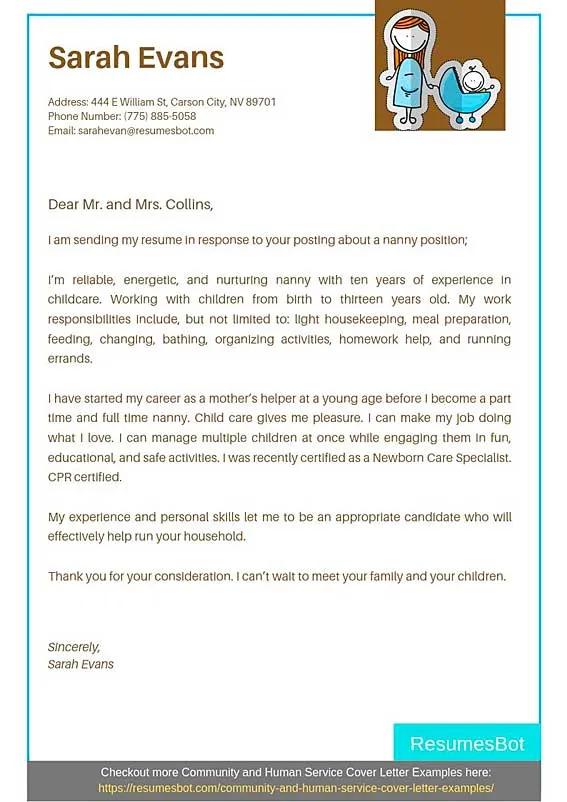Crafting a Standout Nanny Cover Letter
Securing a nanny position often hinges on a well-crafted cover letter. In a competitive job market, a cover letter serves as your first impression, offering a glimpse into your personality, experience, and suitability for the role. This guide will walk you through the essential steps to create a cover letter that grabs the attention of potential employers and highlights why you are the ideal candidate. A strong cover letter doesn’t just reiterate your resume, it tells a story, showcasing your passion for childcare and your unique qualifications. Let’s dive into the specifics of creating a compelling cover letter that sets you apart from the competition and increases your chances of landing your dream nanny job. The primary goal of your cover letter is to compel the reader to review your resume.
Understanding the Purpose of a Nanny Cover Letter
Why a Cover Letter Matters
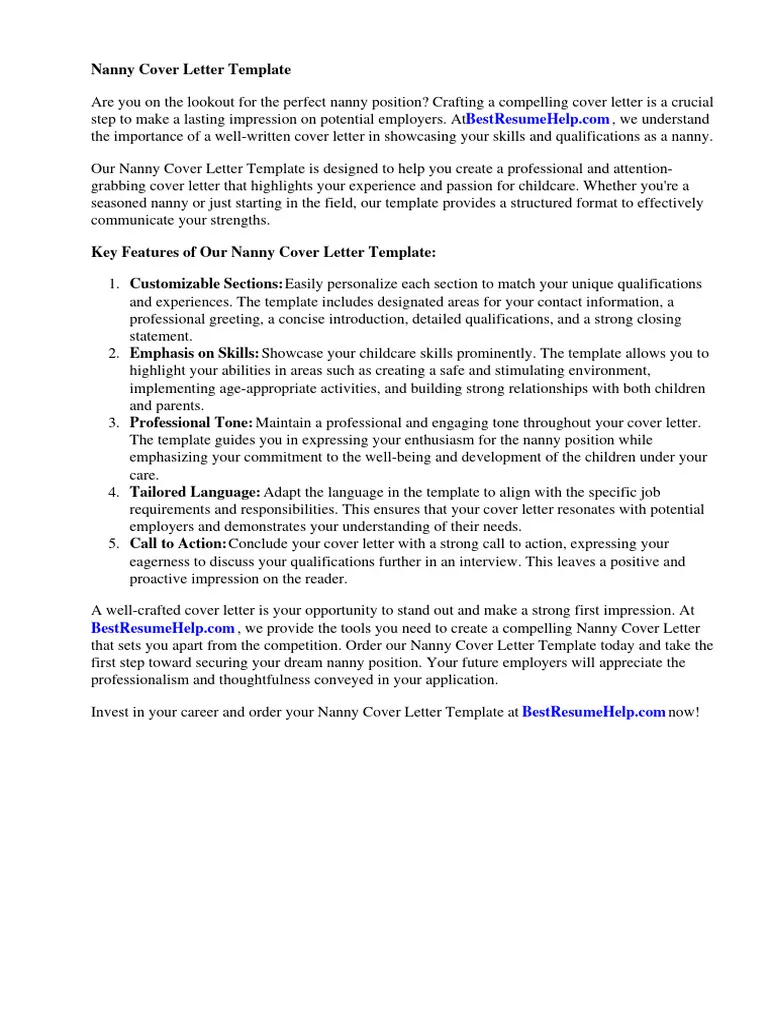
A nanny cover letter goes beyond a simple introduction; it’s your opportunity to connect with the family on a personal level. It allows you to express your personality, showcase your passion for childcare, and demonstrate how your skills align with the family’s needs. A well-written cover letter can set you apart from other applicants, giving you a competitive edge and making the hiring manager more interested in your application. This is your chance to communicate what you’re like and your dedication to childcare.
Key Elements to Include in Your Cover Letter
A strong cover letter is built on key elements. By including these components, you’ll create a compelling narrative that captivates potential employers. Ensure each element is given the appropriate attention. Start with a professional greeting and personalize the letter to the family or the specific job. Your cover letter must grab the reader’s attention so they will read your entire letter, but also look at your resume. The cover letter will set the tone and help to create a good first impression.
Your Contact Information
Begin with your contact details, including your name, phone number, email address, and any relevant links, such as a professional online profile or portfolio. This makes it easy for the family to reach out to you. Place your contact information at the top, making it easily accessible for potential employers to connect with you and follow up on your application. This section must be accurate and current, ensuring that the family can easily find you.
The Family’s Needs and Your Match
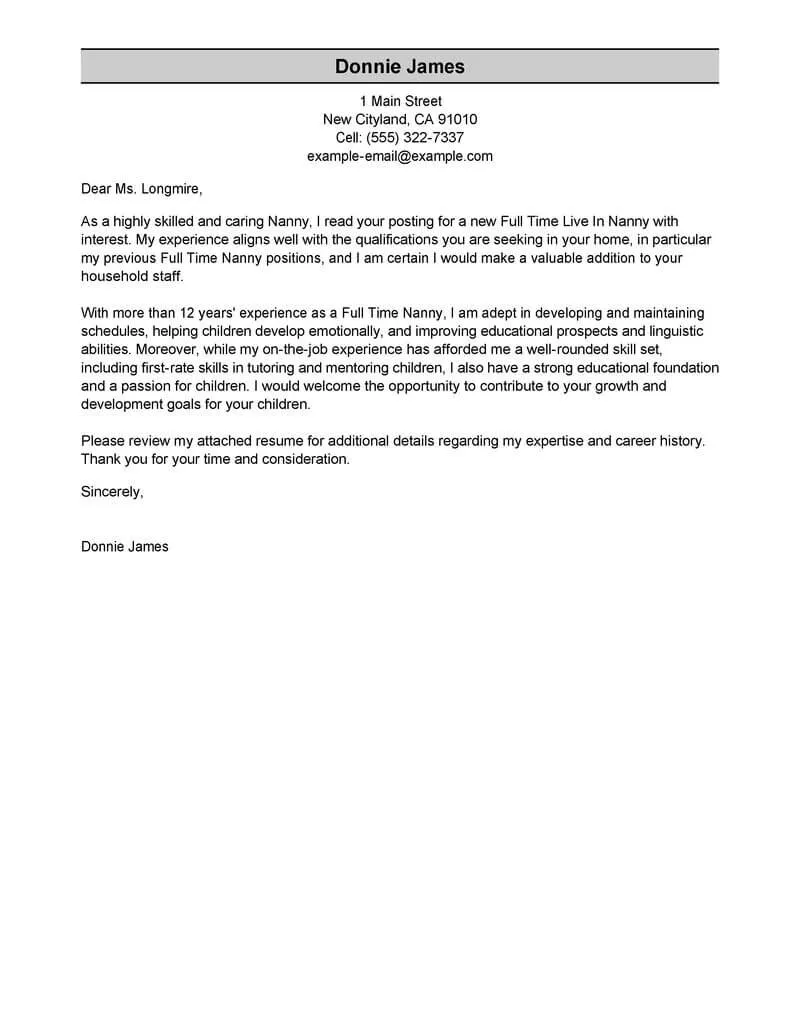
Research the family and tailor your letter to their specific needs. Mention the job posting details and any particular requirements they have mentioned. Express your understanding of their needs and how your experience and skills align with their expectations. If possible, refer to specific details mentioned in their job description or during initial contact. This shows that you have taken the time to learn about them and are genuinely interested in the position. It is a great way to show your interest in the family.
Your Experience and Qualifications
Highlight your relevant experience, including your previous nanny roles, volunteer work, or any other childcare experience. Detail your responsibilities in these positions, emphasizing your accomplishments and the positive outcomes you achieved. Quantify your achievements with numbers, such as the number of children you cared for or the duration of your previous roles. Be specific and provide concrete examples of your skills and contributions. Briefly highlight any specific education, certifications, or special training you possess. Demonstrate that you have the experience to be a great nanny.
Highlighting Your Skills
Focus on the skills that make you an excellent nanny. This section should go beyond a list of tasks; it should demonstrate your abilities and how you will use them to provide a safe, nurturing, and enriching environment for the children. You can also include any specific skills, like the ability to speak multiple languages, or have experience working with children with special needs. Be sure to tailor your skills section to the specific needs of the family and the job description. Make sure the skills are those that make you a great candidate.
Childcare Skills
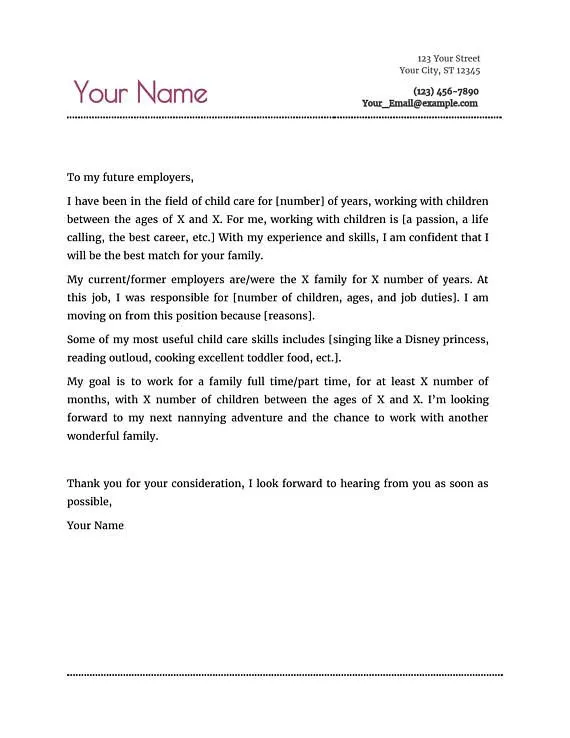
Showcase your childcare skills, such as feeding, bathing, and dressing children. Describe your ability to create engaging activities, plan educational outings, and implement age-appropriate learning experiences. Highlight your experience with various age groups and your understanding of child development. Mention your knowledge of safety protocols, including CPR and first aid certification. Be detailed about your skills and use action verbs to describe what you did.
Household Management Skills
If the role involves household management, describe your experience with light housekeeping, meal preparation, and running errands. Detail your organizational skills and your ability to manage multiple tasks efficiently. Mention any experience you have with managing children’s schedules, organizing playdates, or coordinating activities. Highlight how you can contribute to maintaining a clean, organized, and well-functioning household. It is important to be flexible and able to adjust to the specific needs of the family.
Communication and Interpersonal Skills
Emphasize your strong communication and interpersonal skills. Describe your ability to communicate effectively with children, parents, and other members of the household. Highlight your ability to build positive relationships, resolve conflicts, and create a supportive environment. Mention your experience with patience, empathy, and understanding. This section can also include your ability to communicate your thoughts and ideas. Show that you can develop a strong relationship with the parents and children.
Formatting Your Cover Letter
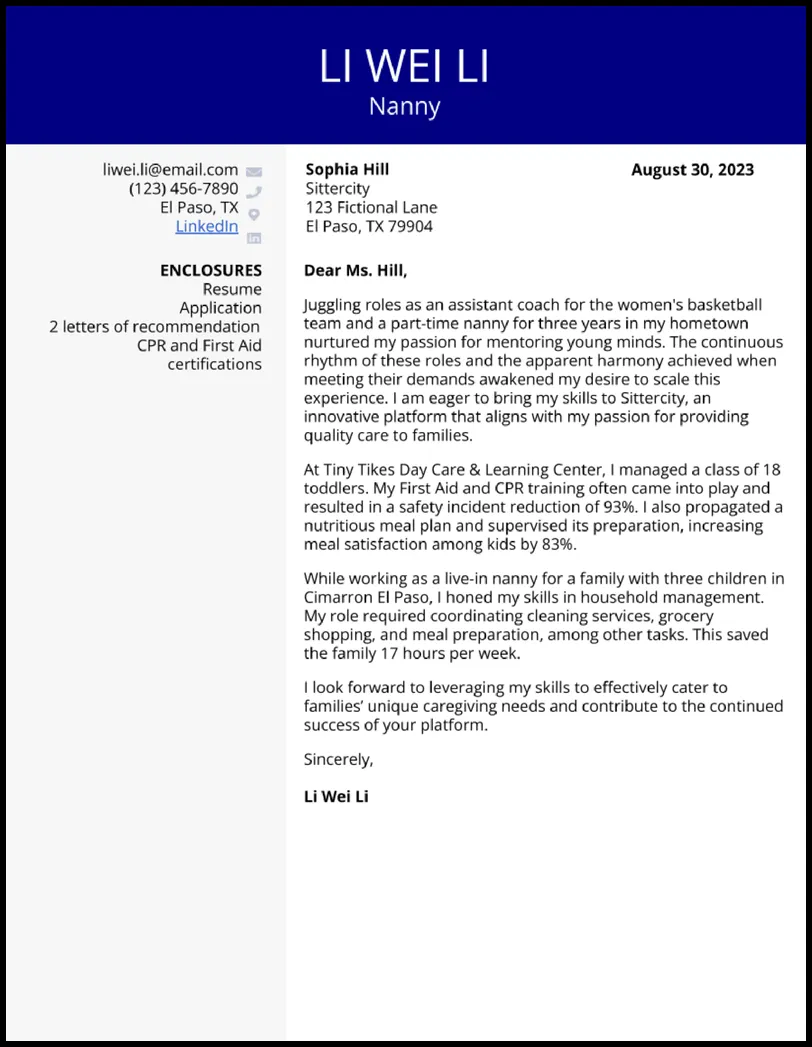
Formatting is critical for readability and professionalism. A well-formatted cover letter ensures that your message is easy to understand and makes a positive impression. Using correct formatting can help you showcase your attention to detail and your respect for the potential employer’s time. Remember, a cover letter is also a chance to showcase your strong communication and presentation skills. By paying attention to formatting, you are making your cover letter more effective.
Choosing the Right Tone
Choose a tone that is professional and enthusiastic. Be respectful, but also let your personality shine through. Avoid overly casual language or slang. Maintain a positive and confident tone throughout the letter. Show that you are enthusiastic about the opportunity and that you are the best candidate. Try to keep the tone upbeat, but also professional. The cover letter should clearly explain what you would bring to the role, which is key to a good impression.
Formatting Guidelines
Use a standard font, such as Times New Roman, Arial, or Calibri, in a size between 11 and 12 points. Use single spacing within paragraphs and double spacing between paragraphs. Keep the margins at one inch on all sides. Break up large blocks of text with bullet points or short paragraphs to improve readability. Ensure your letter is free from grammatical errors and typos. Proper formatting allows for better readability. The formatting makes your letter easier to read.
Review and Editing
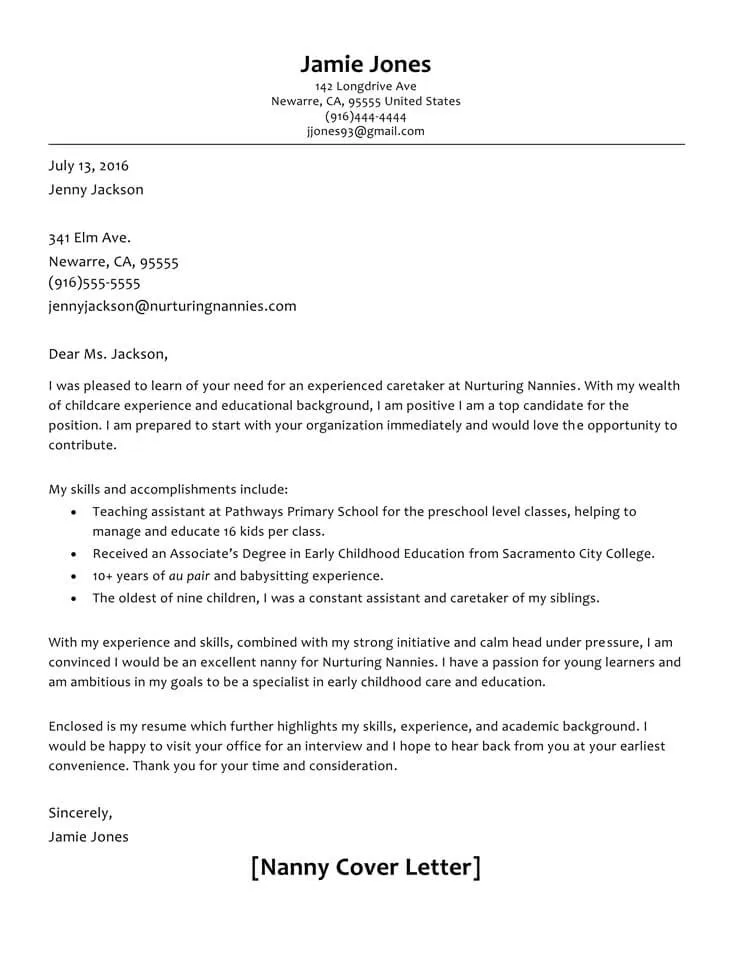
Thorough review and editing are crucial to eliminate errors and ensure your cover letter is polished and professional. A well-edited cover letter shows attention to detail. Proofreading helps to ensure the cover letter is free from mistakes. A well-edited cover letter shows that you care and put effort into your application. Always make sure that your contact information is correct. This will improve your chances of being hired as a nanny. Make sure that the letter flows well and the sections are easy to read.
Proofreading for Errors
Carefully proofread your cover letter for any grammatical errors, spelling mistakes, and punctuation errors. Read your letter aloud to catch awkward phrasing or unclear sentences. Use spell-check and grammar-check tools, but also review the letter yourself, as these tools are not always perfect. Ensure the letter is free from typos. A cover letter that is free of errors makes a positive impression. Proofreading will improve your chances of being hired.
Getting Feedback
Ask a friend, family member, or career advisor to review your cover letter and provide feedback. Get a second opinion on your writing style, clarity, and overall effectiveness. Be open to suggestions for improvement and revise your letter accordingly. Receiving feedback is important. A second pair of eyes can catch things you missed. Make any suggested changes. Getting feedback helps you improve the letter.
Writing a Compelling Closing
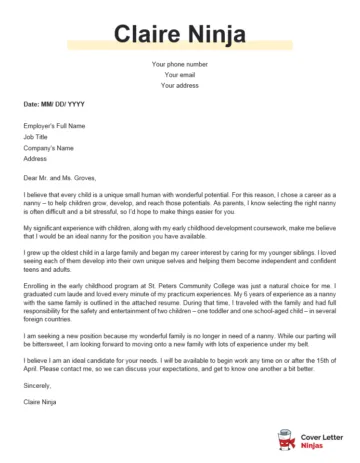
Your closing is your last opportunity to leave a lasting impression. A well-crafted closing can encourage the family to reach out and schedule an interview. Make sure the closing is professional, shows interest, and contains a clear call to action. Your goal is to convince the reader to contact you.
Expressing Your Enthusiasm
Reiterate your enthusiasm for the position and express your genuine interest in the family and their children. Briefly summarize why you are a good fit. This reaffirms your qualifications and reinforces your desire to be considered for the role. Expressing your enthusiasm gives you an edge over other candidates. The closing should be positive.
Call to Action
Include a clear call to action, such as inviting the family to contact you for an interview or to provide any additional information they may need. Provide your contact information again for easy reference. Thank the family for their time and consideration. Making the call to action very obvious will improve your chances of landing an interview. Be specific about the action you want the reader to take.
